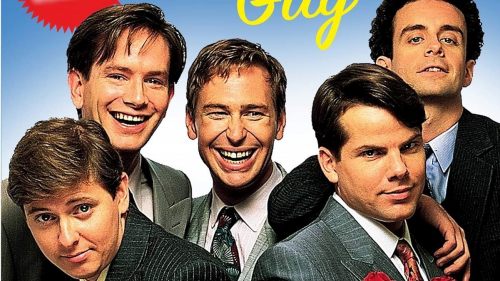Spoon! An Interview With Ben Edlund And Griffin Newman About The Return Of The Tick
It’s a bird, it’s a plane … no, it’s another superhero show, The Tick. Armed with a mega budget to produce their own original TV shows (à la Netflix), Amazon figured it can ride the popularity of caped crusaders while taking them down a notch in the utility belt with The Tick.
There have been different adaptations of The Tick for the past three decades, a testament to the character’s popularity and endurance despite fierce competition. The character first appeared in comics in the 1980s created by Ben Edlund (Angel, Firefly, Supernatural) when he was a teenager. The Tick then graduated to his own animated TV series in the '90s that became a cult hit. Sadly, The Tick stumbled in the early oughts with a failed live-action adaptation starring Patrick Warburton (Puddy from Seinfeld). Edlund is one the few comic book creators – if any – who has played an active role in bringing each adaption to life. Now, The Tick has returned wiser than the last time he was seen in the flesh.
Set in a world where superheroes and supervillains are the norm, an accountant, Arthur Everest (Griffith Newman), meets the indestructible Tick (Peter Serafinowicz) while investigating the disappearance of the world’s most terrifying villain, The Terror (Jackie Earle Haley). The Tick is impressed by Arthur and they form an alliance. Arthur’s sister, Dot (Valorie Curry), disagrees and believes her brother is having a mental breakdown due to childhood trauma relating to The Terror.
Modern comic book adaptations often take themselves too seriously, so it’s easy to forget the absurdity of the fact that Superman wears his underpants on the outside; The Tick operates in this weird headspace. It’s a cross between The Incredibles and Mystery Men because it functions as a superhero story but takes pleasure in the oddities of the world it has created to poke fun at super powered beings and dastardly villains.
We had the honour of chatting with Ben Edlund and Griffin Newman (Search Party) about the character’s legacy, the state of superhero stories and how deep the character goes with its creator.
BMD: The new series has the aesthetic of most live-action superheroes. You used Wally Pfister, cinematographer for The Dark Knight trilogy, to direct, but the surprise is how absurd it gets, was the intention to have the show function like a surprise party?
Ben Edlund: That’s one of the secrets of superhero comedy: you want to always make it a surprise. Our surprise is that you care a little bit. You really want to know how things are going to work out for The Tick and Arthur. That’s a judo flip from the easiest assumption someone’s going to make about the prior live-action version of The Tick (2001), because the one thing you understood was the emotional stakes weren’t really the point of that show.
Griffin Newman: The real asset of The Tick cartoon was that at first glance it looked like the other Saturday morning cartoons, it has a similar kind of aesthetic and production value of the other superhero cartoons of the time but if you leaned in a little closer, you saw the subversion that was going on and it’s the same kind of aesthetic philosophy with the new show. If you make it look like The Dark Knight and place The Tick and Arthur in the centre of it and slowly pull it into a more absurd world, it makes it a little more transgressive and ultimately, funnier, hopefully.
BE: It’s an unusual hybrid and that’s something when working with Amazon it was very important that the companies behind this, including Sony, that they put a lot of investment behind this to give us the ability to get Wally Pfister, and to shoot in New York, and get the setting that, unexpectedly, has a lot of scope.
GN: I was always worried that one day they were going to come on set and tell me ‘okay, get a little goofier, you’re getting too sad’. The character and the circumstances [of Arthur] are very serious but I feel like a lot of shows could then get scared and become flippant about it and just go for the easy laugh, and I think that was philosophy behind the show, which is we take certain elements very seriously and really invest in them with a lot of care and compassion, which make the traditional strengths of The Tick pop more.
BMD: The mantra of The Tick is optimistic, especially considering the mental health issues central to the opening episodes and living in the wake of trauma. But there’s something refreshing about a hero who doesn’t shun the responsibly and thrives as a hero, did you feel that was the true power of The Tick?
BE: Yeah, love and optimism openly expressed by a hero.
GN: A very uncynical, un-strategic sense of goodness above all else.
BE: It turns out to be a little radical, which is kind of weird, it’s a radical energy in the superhero universe. Christopher Reeve as Superman is like that in a non-goofy way but when he gets down to just talking about what he’s there to do, he just loves people and wants to help the planet.
GN: I remember when I saw Wonder Woman the thing that blew me away the most was how many shots there were of her smiling or laughing, in satisfaction at something she had done, no cockiness, but pure joy over something. And that felt weirdly subversive to put something that genuine and positive in a movie. So much of the superhero fiction now is about [puts on gravelly voice] ‘should I even be the hero? Should I hang up the cape? ggrrrrr’. Or they’re fighting other heroes with slightly different politics than their own [laughs]. Wonder Woman just loves saving people. And The Tick, we made the pilot last May [2016], and then we starting filming the season in March [2017], a little less than a year but a good span of time in which the pendulum swing was happening in America and in our culture, and I felt like when I was making the pilot and I’m reacting to The Tick, talking to him like he was a creature, and it was like ‘oh! What a charming oaf’; he’s a nice, positive buffoon character’. But when we came back in the wake of everything that has happened in our culture, I was so relieved to be in scenes with The Tick. I was like, ‘what a nice guy! What a force for good! What a positive character!’ I think we got lucky with the timing of that.
BE: It does almost seem like a political assertion to say that being nice counts [laughs].
GN: Empathy has become a partisan topic, it has become an issue. Where do you stand on empathy as an abstract concept, and The Tick is not in it for the credit, he’s not in it for the glory, he just likes helping people.
BMD: We’ve reached the saturation point with superheroes on film and TV, yet the timing of The Tick feels perfect. Was that ever a consideration when approaching the show? Cause it’s like an antidote to the glut of superhero stories.
BE: I do feel as though the swing of the pendulum this far into the superhero saturation of our culture, I kind of did feel like it was calling The Tick back out. But it creates a lot of pressure and fatigue with the number of superhero things in the public canvas, and that’s the exact kind of environment you want to let the air out of things and have fun. And that’s where we’re at now and that’s what The Tick has done cyclically, like a locust, every sixteen years feeding on the culture and then sleeping again [laughs].
BMD: Ben, you created The Tick when you were a teenager and there’s been a version of it around each decade for the past 30 years, why do you think it has endured?
BE: I did not intend for this to last any particular amount of time, only that, it always seemed to have some kind of fuel to go on. It’s been great. It got me into TV, it got me into live-action, it got me into a lot of places that I wanted to be. I’m grateful for this weird work.
GN: The Tick and Arthur have been the constant throughout all these different versions and characters don’t stick in the culture like that for 30 years, and stay in it, unless they’re tapping into something elemental. It helps that superhero culture has continued to bloom and expand, which makes a context where they make sense, but I also think there’s this id/ego thing to Tick and Arthur. To some degree The Tick is who everyone wants to be, and Arthur is who everyone fears they are, and you try to figure out how to balance the two so you can get through your day.
BMD: Ben, what’s the secret to protecting something you created for this long?
BE: It’s an unusual situation now this [the Amazon series] being the fourth distinct iteration of these characters culturally, and then the through line being the kid who made the comic book 30 years ago, that to me is an interesting narrative alongside the ongoing essence of these characters that seem to hold their own through different forms. I’ve always been the least protective [laughs], someone says, ‘you want to try this again? Maybe mess it up?’ I’m like, ‘yeah, let’s do it again’. You want to do The Tick on ice? Absolutely! It has been a blue key that has gotten me through interesting doors into new areas of expression. It is just fortunate that superhero culture is so oddly tumescent because it gives me a place to play further games with these characters. These characters aren’t like superheros to me, these characters are like a relation. When it was looking like Amazon was going to pick up the series and I had to make a real commitment to make it happen, I did have a moment driving and, actually, almost involuntarily having a sense of the presence of The Tick in the passenger seat, just a weird waking fantasy, a sense that he [the Tick] was there – this sounds crazy – and he was urging me to make another form for his being.
BMD: Is there truth to the rumour you’ve got a 5-year plan for the series?
BE: It’s designed as a story with a clear beginning, middle and end, which is one of the reasons I came back. What’s going on Arthur’s planet relates to the superhero phenomenon and what The Tick is, and we want to go places with that and make it feel like they had a purpose. So I see it as a five-season rough arc.
The Tick is now available to stream on Amazon Prime Video.



